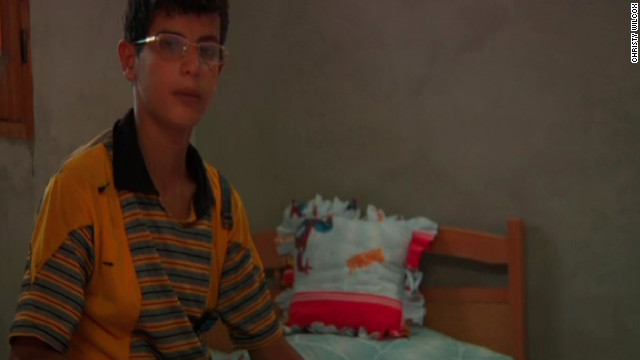
- A family mourns for their son -- gunned down on the day Ramadan started
- His brother said: "Everything reminds me of him"
- Ali Mansour was killed in Al Bab, Syria, the scene of fierce fighting
- Free Syrian Army has carved out an enclave in Al Bab but locals still fear for their lives
Editor's note: Erin Banco is a freelance journalist based in Cairo, Egypt who has spent a week working inside Syria. Her work has been published in Newsweek, and many U.S. newspapers and Middle East regional publications.
Al Bab, Syria (CNN) -- The small room in the back of the Monsours house is set up for two people -- two desks, two night stands, and two beds. Both beds have matching sheets and pillowcases adorned with Superman caricatures.
Jihad Monsour, 13, slouches on the edge of one of them. He lightly wipes his eyes from under his thin frames and stares through the empty doorway. It is only him that sleeps in this room now. He used to share it with his older brother Ali -- a victim of Syria's violence.
"Everything reminds me of him," Jihad says. President Bashir Al-Assad's forces killed 17-year old Ali while he was driving his motorbike during the first day of the battle for Al Bab last month.
About 120 people from Al Bab -- a city in the north of Syria not far from Aleppo -- have been killed since the beginning of the conflict. Some of them soldiers with the Free Syrian Army, others civilians.
See a gallery from the fighting in Aleppo
In recent weeks, an increased number of citizens in Al Bab have died at the hands of government air strikes. Now the airstrikes are not only killing people originally from Al Bab, but also those displaced by violence in Homs and Hama who are seeking refuge in the city.
Jihad is wearing a yellow collared shirt that his brother is seen sporting in a photo framed on a table across the room. Hanging from the bedroom walls are decorations from the boys' childhood -- Mickey Mouse and Winnie the Pooh plastic cut-outs.
The dresser on the other side of the room still holds all of Ali's old school books. He had been studying to become an engineer. Jihad strokes the sheets with his left hand and then grabs hold of Superman's foot to compose himself.
"I think of him when I play football, when I ride the motorbike around the city, or just when I am reading," he says.
As the Mansours got together for the last day of Ramadan their thoughts were dominated by one day -- July 19, which this year was the start of the Muslim fasting period and the day Ali was killed.
Ali was on his way to school for a tutoring session with a friend when the bullets hit him, one in the arm and one in the stomach. Propping Ali's body up on the back of the bike, the friend rushed him to the local hospital for treatment. But Ali's injuries were too severe. He was evacuated to a hospital in Kilis, Turkey; his father, Hassan Ali Monsour followed.
"I hoped that he would recover and I would take him home from the hospital walking and that he would be fine," Hassan says. "I never thought that he would die."
Hassan sits against the bedroom wall on the ground, legs crossed under his white gallabaya. He peers up at the picture of his son that sits on the table beside him. "He was a good boy," he says.
The Free Syrian Army has carved out an enclave in Al Bab, but despite the withdrawal of government troops, citizens say they still fear for their lives. The fluidity of the fighting around Aleppo province makes the situation on the ground, and in the air, completely unpredictable.
"The government is killing innocent civilians randomly," Hassan says. Eight bombs dropped on Al Bab within 48 hours this week, killing at least four people, including one six-year-old girl, according to witnesses.
Like many towns that surround violent hotspots such as Aleppo and Damascus, citizens have come together to honor the dead, sometimes showing up in thousands to remember a victim.
Dozens of YouTube videos show citizens of Al Bab gathering in the thousands, organizing themselves in mass prayers for those who have died.
Everyone in the neighborhood knew Ali, his brother says. His death was one of the first in the city and his funeral was attended by hundreds of people. Neighbors and family friends offered the Monsour family money and gifts after Ali's death, but they turned them all away.
"There are people now that need that money more than we do," Hassan says.
According to the British-based Syrian Observatory for Human Rights over 17,000 people have been killed since the conflict began last year. As many as 11,800 civilians have died, Ali included.
The youngest daughter of the Monsour family runs into the bedroom and stands next to her brother. She is three years old. Jihad pulls his sister close to him. She hides behind his leg, every so often peeking around to catch a glimpse of her father.
"She is waiting for him," Hassan says with a nod. "She always asks when he will come home. I tell her: 'You will see him in paradise.'"
No comments:
Post a Comment